Guinea pigs are small and sensitive animals. When they can attract diseases, it is very hard to tell if they are sick or not. This means you need to be very careful around your pet.
Can guinea pigs catch human colds or any other human disease? Guinea pigs can catch some human diseases. Viral infections will not pass from human to animal because they are specific to our biology. However, guinea pigs can catch upper respiratory infections or any other bacterial conditions from interactions with sick humans.
Guinea pigs love affection, and they enjoy cuddle sessions with their humans. However, if you are sick, you should avoid this contact with your pet. Knowing how your cold or infection can spread to your pet and understanding the symptoms of disease in your guinea pig can help you protect the health of your pet. Read to learn more.
Table of Content
A Healthy Guinea Pig
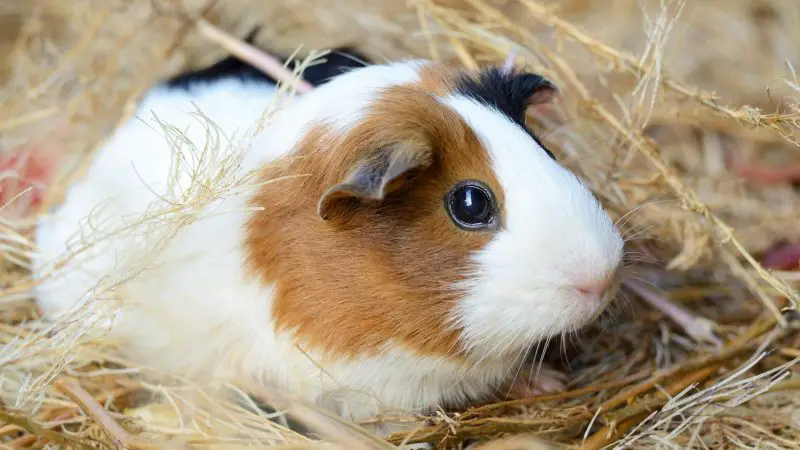
At least once a day, check on your guinea pig to catch any problems early and have them treated by your veterinarian. The following are signs of healthy guinea pigs:
- Shiny coat and bright, clear eyes
- Playful and active
- Clean nose and mouth
- Good appetite for food
- Teeth that are yellow
- Their bottom is clean and dry.
If your guinea pig loses weight or loses his appetite, it may be indicating that they are unhappy, if not sick. So, better to have them evaluated by a veterinarian.
Can Guinea Pigs Catch A Cold?
Guinea pigs have much more delicate respiratory systems. Something that we can handle easily is more dangerous for them.
Guinea pigs can catch a cold, but it depends on the virus. Colds are caused by one of the numerous viruses (most notably Rhinovirus), which mostly infect humans rather than guinea pigs. If you have a cold caused by the Rhinovirus, it is unlikely that it will impact your guinea pig. However, it is possible to spread a cold or flu to your guinea pig if it is caused by influenza A or B, or another virus that your pet is vulnerable to.
What Diseases Can My Guinea Pig Catch From Me?
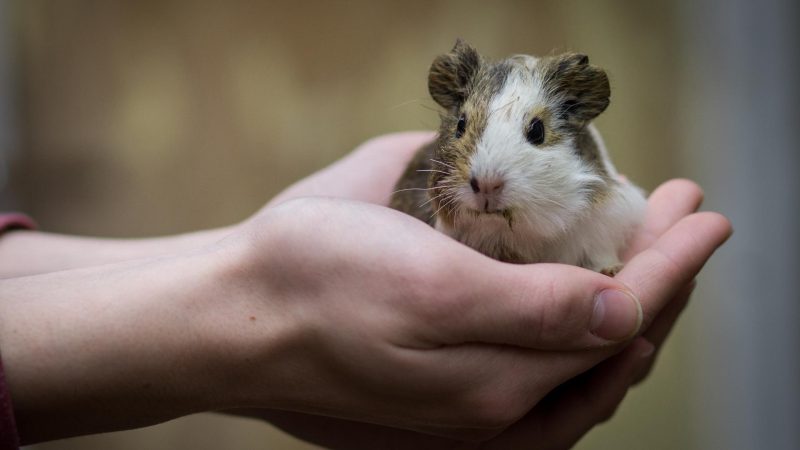
Although we may love our cuddle sessions with our guinea pigs, this interaction has the potential to make your animal very sick. When you pass a disease or a condition to an animal, this is called a zoonotic disease. These are infectious conditions that naturally move between humans and animals without regard to their genetic makeup.
Zoonotic diseases include parasites, viruses, bacteria, and fungi. The three main diseases you can pass to your guinea pig are bacterial infections, influenza, and ringworm.
1. Bacterial Infections
There is no cure for the common cold, but most colds are viral infections. However, in some cases, a bacterium can be the source of your disease. If you are prone to catching colds, you should take steps to prevent spreading it to others in your household, including your animals. Our larger respiratory systems and stronger immune systems are more capable of recovering from these diseases.
However, guinea pigs have much more delicate respiratory systems. Something that we can handle easily is more dangerous for them. If you have a sniffle, you should avoid touching your guinea pig, in case it is bacterial. Even if you wash your hands before and after, there is still a chance that your guinea pig can catch your disease.
2. Influenza
Even in humans, upper respiratory infections and influenza are dangerous diseases that require a doctor’s care. In most cases, humans need a round of antibiotics to clear up the condition. When you pass this to your guinea pig, it is much more severe. Their little breathing passages and lungs cannot handle this human disease, and they may die from it without proper treatment.
3. Ringworm
Humans can also infect their guinea pigs with ringworm. This fungal infection usually passes from pets to humans, but you can easily pass it to your guinea pig. Especially if you enjoy lots of cuddle time with your guinea pig that includes petting and snuggling, you can give your guinea pig ringworm. The fungus spreads from your skin to the skin of your pet.
If you know that you have ringworm, you should not touch anyone until your treatment is complete. To avoid spreading ringworm to your guinea pig, avoid touching them at all costs. Enlist the help of a family member or a friend until your ringworm clears up.
How Did I Spread My Disease to My Guinea Pig?
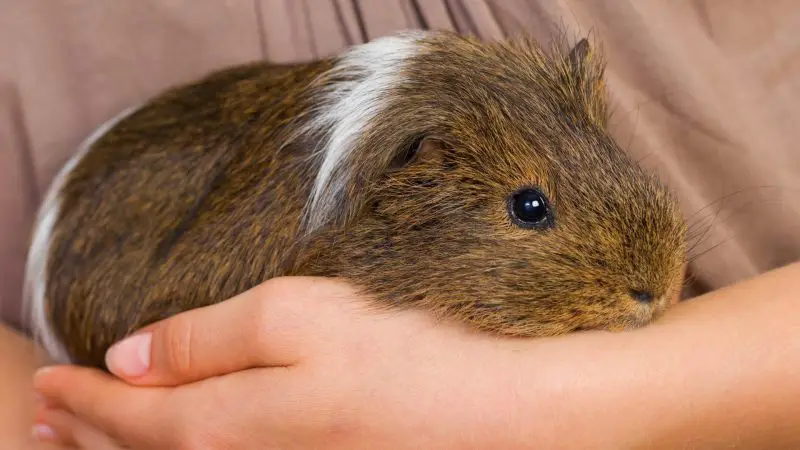
If you have a common viral cold, your guinea pig will not catch it. This is a condition that is human-specific, and it cannot spread to animals. However, viral conditions lower our immune systems, which can make us more susceptible to catching bacterial conditions that our healthy bodies would naturally fight off.
When you are sick, germs infect the air through respiratory liquids, such as saliva and mucus from sneezing and coughing. If you are ill with a bacterial infection, you can spread it to your pet. Since their respiratory systems are so fragile, they are more likely to catch these conditions from you than not.
When handling your pet, fungal infections can spread from skin to skin contact. Although your guinea pig has fur (unless you have a hairless guinea pig), fungi can still infect their skin.
What Are the Symptoms of a Sick Guinea Pig?
Regardless of whether or not you are sick, you should always know what symptoms to look for in a sick guinea pig. If your pet is sick, it will show signs. Your guinea pig will become listless, and it may refuse to eat or drink. There will also be a change in their bowel movements, and they may not go as regularly.
More physical signs of a sick guinea pig are changes in the consistency and thickness of their fur, and their ordinarily protruding eyes will recede into their head. In the case of respiratory conditions, guinea pigs will cough, sneeze, and wheeze. If you notice any discharge coming from your guinea pig’s eyes or mouth, or if your piggie has crusty eyes, you should bring your pet to the veterinarian.
When Should I Bring My Guinea Pig to the Veterinarian?
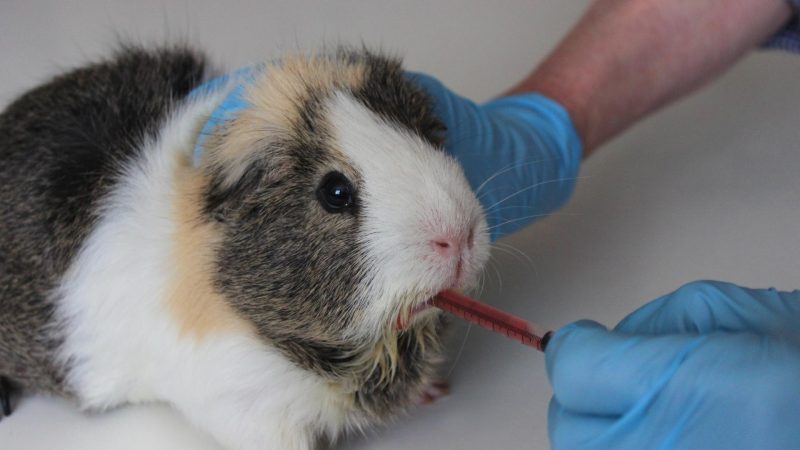
If you have a bacterial or fungal infection, and your guinea pig begins to show symptoms, you should call your veterinarian and schedule an appointment. Give as much information as possible about your disease than you may have passed to your pet and how long your guinea pig has been showing symptoms. This will help your vet diagnose the condition and prescribe the appropriate treatment.
It is essential that you do not wait for these symptoms to pass. If your sick guinea pig does not receive proper treatment, the condition can become much worse. Many diseases that you may give to your guinea pig may be fatal without appropriate treatment.
What Is the Best Way to Treat a Sick Guinea Pig?
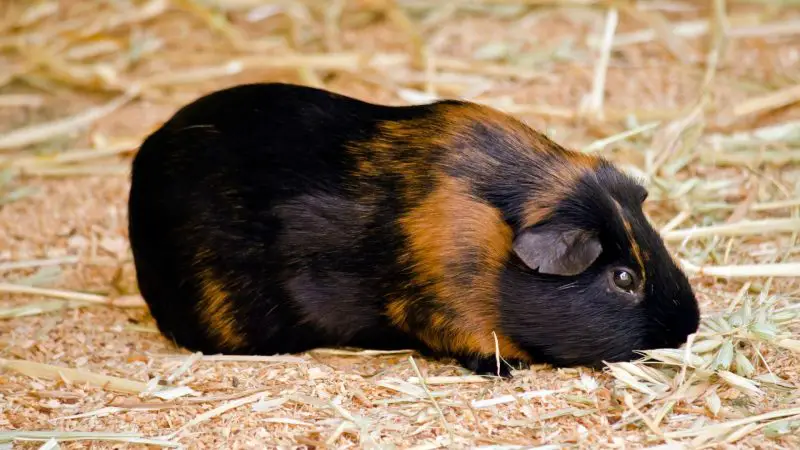
If your pig exhibits any of the aforementioned signs, you must take the following actions:
- Take them to a veterinarian who specializes in guinea pig care.
- If you notice that your guinea pig’s weight changes unnaturally, it’s a definite indicator that they’re sick. You should weigh them once a week and look for the symptoms of a sick guinea pig described above. A guinea pig who refuses to eat for more than a day is most certainly sick and should be sent to the vet immediately.
- Your pig will require plenty of rest in a warm, clean environment while recovering. Before allowing your guinea pig to return to its cage, it must be fully cleaned and disinfected. To avoid the spread of illness, keep sick pigs isolated from healthy pigs.
- Ensure that your cavy eats a well-balanced food rich in nutrients, particularly vitamin C, on a regular basis.
- You can use natural paper bedding, which has no harsh chemicals that might hurt tiny animals, to make their cage warmer.
How Can I Prevent My Guinea Pig From Getting Sick?
To prevent your guinea pig from getting sick, you can do the following:
- The simple act of touching your guinea pig when you are sick can make your pet sick. Avoiding touching them can prevent your pet from catching your cold or infection. If you have to touch them, make sure that you wash your hands vigorously and wear gloves before interacting with them.
- Keeping cuddling to a minimum while you are ill will prevent the spread of germs. Make sure that you handle their bedding, food, and water sources with care by wearing gloves.
- Although there are steps to prevent spreading your disease to your pet, it is always best to avoid them altogether when you are sick.
- Have a member of your household take over these duties until you are feeling better. Your family members, including children, will enjoy the extra time with the animals, and your guinea pig is less likely to get sick.
- If you are still worried that your piggie will become ill, using a water-based air purifier can help keep your entire household healthy, including your animals. However, if you use strong-scented essential oil in your purifier, make sure that the machine does not sit too close to your guinea pig cage.
Can I Bring My Guinea Pig to the Same Veterinarian That Treats My Other Animals?
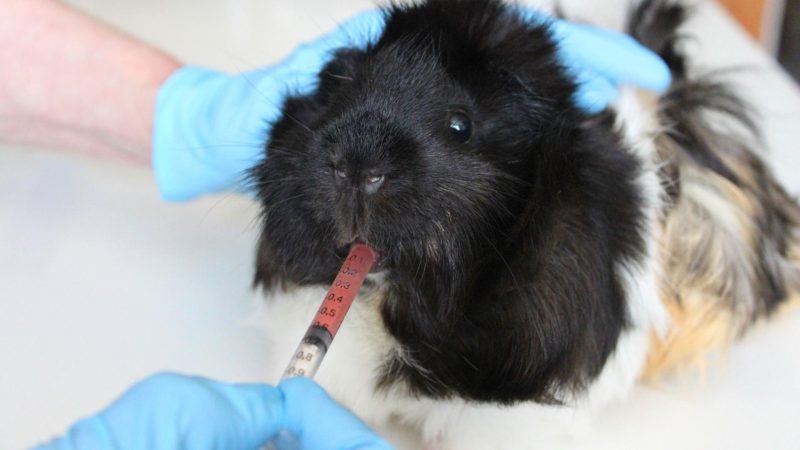
It depends on the species of your other pets. There are two types of veterinarians: doctors who treat domestic animals, such as dogs and cats, and exotic animal veterinarians. These doctors treat several species of exotic pets, including pets, rodents, and reptiles. A quick Google search of exotic animal veterinarians in your area will provide a list of professionals that can treat your guinea pig.
How Will My Exotic Animal Veterinarian Diagnose and Treat My Guinea Pig?
If your guinea pig is showing symptoms, your veterinarian will order a series of tests to determine the nature of your piggie’s disease. Most commonly, they will order bacterial cultures and x-rays, but they may order other tests to confirm the condition.
Depending on the severity of the diagnosis, your veterinarian will order antibiotics or other treatment to help your guinea pig recover. If your pet has never been sick before, the professionals in the office will show you how to administer the medicine.
What if I Can’t Give My Guinea Pig the Medicine It Needs?
You may find that giving your guinea pigs their medicine stresses them out. For a small fee, many veterinarian offices will give your pet their daily medication. They are trained professionals, so they know the proper techniques to give your pet the treatment it needs with the least amount of stress to your animal.
Related: Can Guinea pigs make you Sick?
